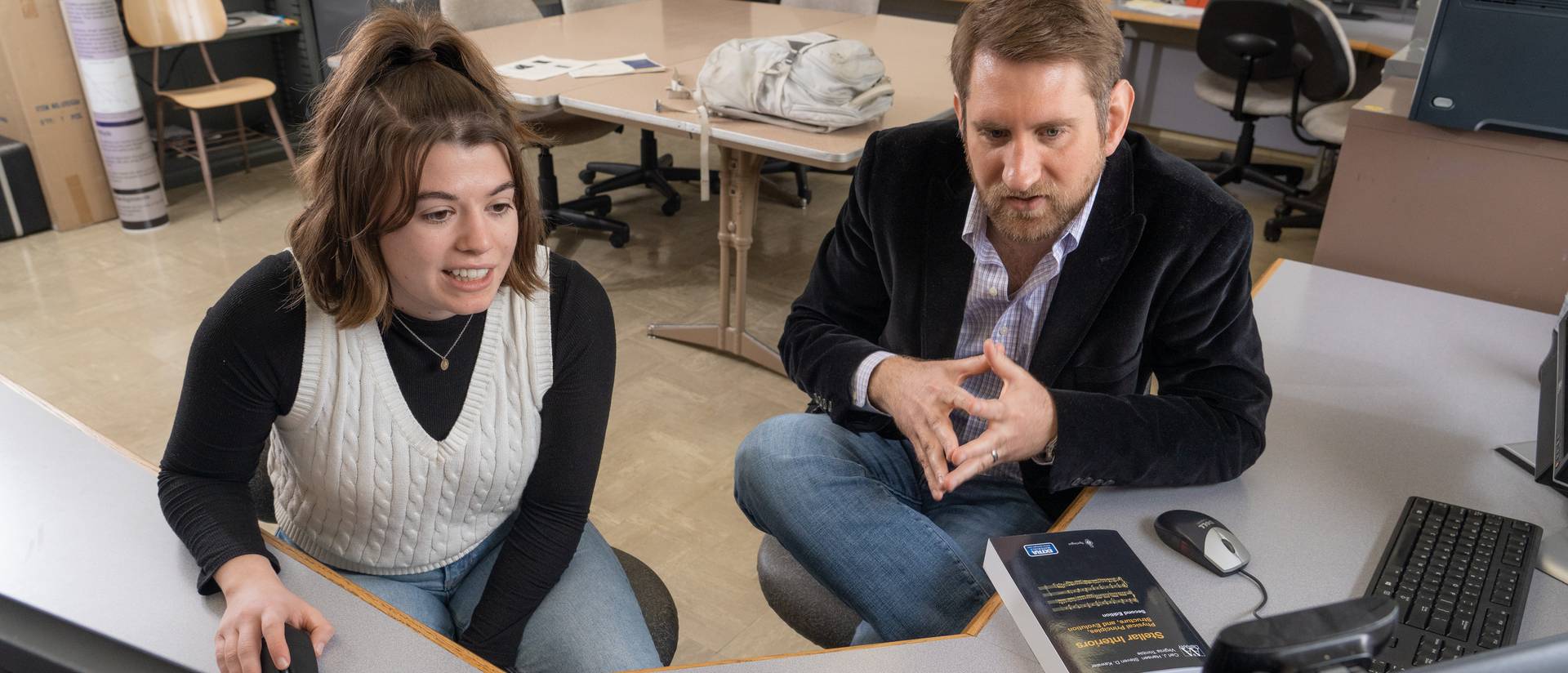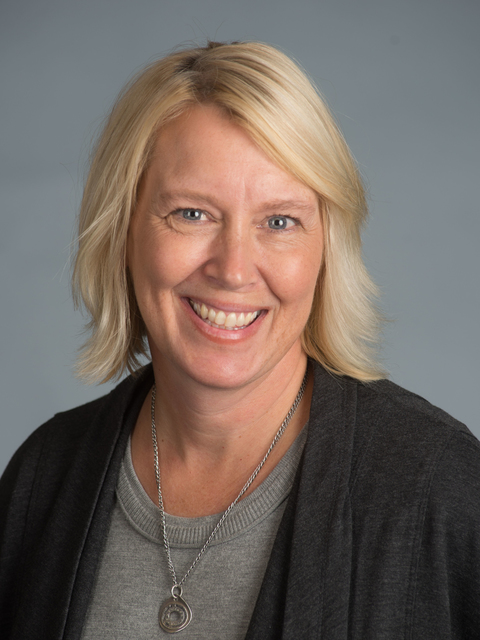Photo caption: Sophomore Alexis Rustin and Dr. William Wolf, assistant professor of physics and astronomy, have been collaborating on computational astrophysics research. This summer, Rustin will be one of three Blugolds who will work with Wolf on research supported by a newly awarded National Science Foundation $526,813 CAREER grant. (Photo by Shane Opatz)
Dr. William Wolf, assistant professor of physics and astronomy at the University of Wisconsin-Eau Claire, received a five-year, $526,813 CAREER grant from the National Science Foundation to work with undergraduate students on research.
The prestigious NSF CAREER grant supports early-career faculty who have the potential to serve as academic role models in research and education and to lead advances in the mission of their department or organization.
Beginning this summer, Wolf and three student researchers will use the NSF funds to study accreting white dwarf stars, a growing field of astrophysics research. Accreting white dwarfs are what most stars become after they’ve burned off the hydrogen that fuels them.
“The common thread in all aspects of our work is using MESA (Modules for Experiments in Stellar Astrophysics),” Wolf says. “MESA is an open-source project that allows researchers, teachers, students and amateurs to build computer models of stars. It can run on laptops or supercomputers.”
MESA is “a powerful tool for doing research-grade stellar modeling,” Wolf says. Using MESA in their research will help students regardless of their path after college, he says.
“This research experience will help students in their future careers inside or outside academia,” Wolf says. “Students will build transferable technical skills and practice professional communication through writing papers and giving presentations. Being able to demonstrate these skills will give them a leg up when they apply to graduate school or for jobs in STEM fields.”
Wolf worked with MESA as a graduate student and later joined its developer team. He continues to help maintain the infrastructure for MESA, so he understands “what it can do and what is needed to keep development humming.”
The NSF CAREER award requires recipients to integrate research and teaching, something Wolf already has done for the MESA summer school program. He will create something similar at UW-Eau Claire.
“I’ll develop online exercises that will take new researchers from zero exposure to competency in using MESA for research-grade work,” Wolf says. “I’ll also create exercises that professors can use in undergraduate astrophysics courses.”
Developing lab exercises for learning and using MESA that provide a “more streamlined onboarding process” to MESA will benefit Wolf’s students but also other researchers at UW-Eau Claire and elsewhere, says Dr. Erik Hendrickson, professor of physics and chair of the physics and astronomy department.
“The educational impact of these modules will go far beyond our UW-Eau Claire classrooms,” Hendrickson says. “Dr. Wolf will provide tested MESA exercises to instructors around the world.”
UW-Eau Claire’s physics and astronomy department has long valued the integration of research and teaching, so Wolf’s project is a great fit, Hendrickson says.
“Dr. Wolf’s research proposal dovetails perfectly with this component of our degrees by providing opportunities for a rotating group of three students to gain research experience while training them to conduct numerical experiments with a modern high-performance computing facility,” Hendrickson says.
Alexis Rustin, a sophomore chemistry and physics major from New Ulm, Minnesota, already is working on computational astrophysics research with Wolf. She’s excited to continue her work as a member of Wolf’s summer research team.
“Being involved in research is really important to me,” Rustin says. “It’s something I’ve been interested in for a while, and hopefully something I will continue after college. This summer, I hope to learn a lot about astrophysics and get experience with the application of what I’m learning in my classes.”
Rustin’s future goals include earning a master’s degree in physics and then working in the field of research and development. She’s confident her research with Wolf will help her achieve those goals.
For their NSF-supported research, Wolf’s research team will use UW-Eau Claire’s BOSE supercomputing cluster, a tool that enhances learning, research and discovery by delivering large amounts of information through fast-paced, high-performance computing.
“With MESA available on our computing cluster and the exercises Dr. Wolf is developing, students in our upper-division astrophysics classes will gain experience working with a research-grade software instrument, effectively bringing research into the classroom,” Hendrickson says.
These kinds of learning experiences will benefit students during and after college, Hendrickson says.
Sam Hearden, a junior who recently began working on research with Wolf, agrees, saying he’s especially interested in learning how to use MESA this summer.
A physics major and mathematics minor from Dubuque, Iowa, Hearden says having an undergraduate research experience and an understanding of MESA will give him an edge when applying to physics graduate programs. It also will give him “a true understanding” of what research might look like in his future career, he says.
Wolf also developed and now teaches the university’s computational physics course, which encourages computer-minded students to pursue this newer area of research.
Elaina Plonis, a freshman who has majors in applied physics and computer science, software engineering, and a minor in mathematics, is one of those computer minded Blugolds. Plonis, who also will be part of Wolf’s summer research team, hopes her research experiences will help her stand out when applying to astrophysics graduate programs.
“This research will help me apply and connect what I'm learning in my physics classes to my knowledge of computer science,” says Plonis, a native of Macomb, Michigan. “I also hope doing undergraduate research will help me get into an excellent graduate school, and that it will prepare me for research during and after college.”

